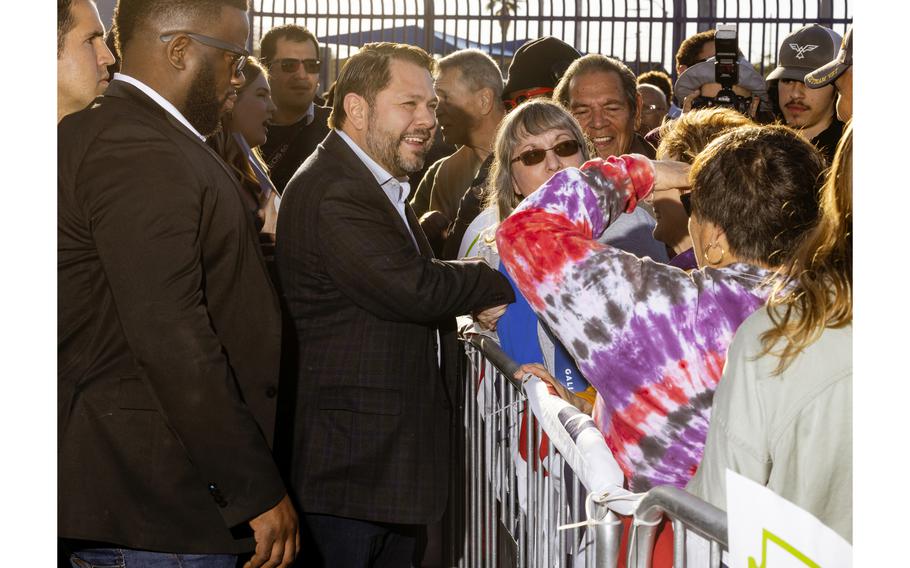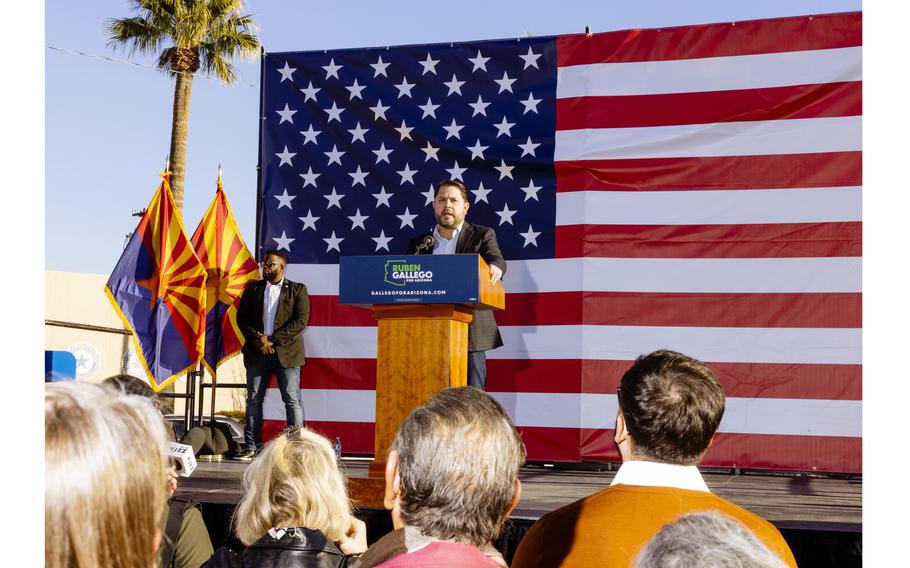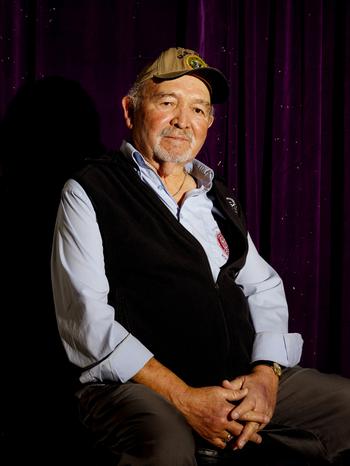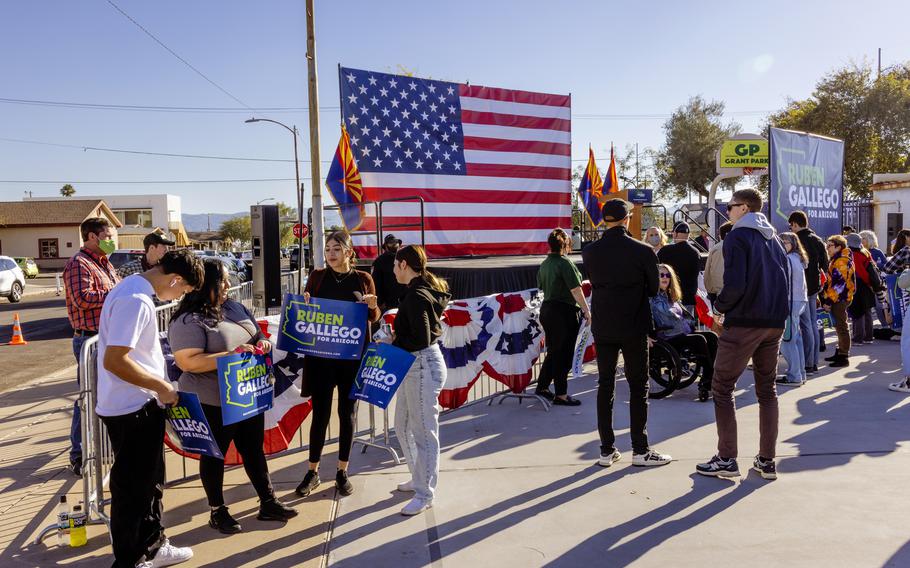
Rep. Ruben Gallego (D-Ariz.) meets supporters at a campaign event at Grant Park in Phoenix on Jan. 28, 2023. (Cassidy Araiza/for The Washington Post)
PHOENIX — U.S. Army veteran Richard Lucero held back tears under his dark-tinted sunglasses as he stood in Grant Park and watched Rep. Ruben Gallego (D), a fellow Latino veteran, kick off his U.S. Senate campaign as a crowd of several hundred supporters cheered him on.
“To see someone like us? Oh my God,” Lucero, 76, said, pausing as he choked up. “It means a lot. It really means a lot.”
Lucero is already sold on Gallego as the best candidate for the U.S. Senate seat that is up for election in 2024, but he’s hoping that voters outside of the congressman’s majority-Hispanic congressional district will support him, too. “He’s going to fight for Arizona. But we have to do our part to get him there.”
Though the election is 21 months away, Gallego is looking to build on the strong Latino support he has received in his Phoenix-area district — and he is not taking that support as a given. Arizona is home to about 1.2 million eligible Latino voters, who represent about one-fourth of the electorate, but hundreds of thousands are either not registered to vote or they’re on the rolls but don’t vote, according to voter records and census data. Gallego wants to target Latino voters who typically don’t participate and are disillusioned and distrustful of politicians.
“They are right. We have let them down,” Gallego said in an interview this past weekend. “If you’re a working-class Latino in this state and you’re making maybe 20 bucks an hour, or your husband or partner makes 20 bucks an hour, and you have two kids, you’re barely making it. And then politicians run every year and say, ‘I’m going to change it,’ and it doesn’t change.”
Sen. Kyrsten Sinema, center, walks to the Senate floor on Capitol Hill on Aug. 4, 2023. (Jabin Botsford/The Washington Post)
Gallego’s run comes amid dissatisfaction among Democrats with incumbent Sen. Kyrsten Sinema, who last month announced she was leaving the Democratic Party and registering as an independent. The freshman senator has angered many of her constituents by withholding support for some Democratic proposals, including a provision in a coronavirus-relief package for $15 minimum wage and ending the filibuster to pass federal voting-rights legislation.
Sinema has not announced whether she will run for reelection, though many political insiders in Arizona expect she will, opening the door for a three-way general election race in the battleground state.
Interviews with more than a dozen Latino voters in the state illustrated deep frustrations with Washington. They said politicians have failed to respond to their everyday needs, including tackling the rising costs of prescription drugs, rent and groceries. They also expressed disappointment that Democrats seeking their votes make promises, like passing comprehensive immigration reform, that are never fulfilled.
Adriana Eseberre Arellano and her mother, Manuela Eseberre, at their home in Phoenix. (Cassidy Araiza/for The Washington Post)
Adriana Eseberre Arellano, 22, and her mother, Manuela Eseberre, 52, who both live in Phoenix, represent two different types of Latino voters that Gallego will need to excite in his campaign. Eseberre Arellano is a big fan of Gallego, but her mother isn’t very familiar with him, saying she only knows he’s a congressman.
Eseberre Arellano, who works in insurance, said Gallego needs to engage more Latinos in her parents’ age group, while appealing to younger people, like some of her friends, who feel that voting doesn’t matter.
She credits the implementation of S.B. 1070, Arizona’s anti-immigrant bill that was signed into law in 2010, as part of what prompted her to plug into politics at an early age. The law, which included a provision allowing police officers to ask for proof of citizenship, was viewed by many as targeting the state’s Latino population and was later partially struck down in the courts. The law energized a generation of young Latinos to organize at the grass-roots level for more political power and influence in the state.
“Mis amigas who have been born here either never had to feel the fear of S.B. 1070 or never had undocumented parents, so they just tend not to care. When I talk to them about politics, they zone out. They don’t vote, that’s for sure,” Eseberre Arellano said. “It’s hard to get people to care when they feel like it doesn’t affect them.”
Voters in this state are used to candidates, particularly Republicans, pressing messages calling for stricter border security and crackdowns on illegal immigration. Although candidates from both major parties have broadened their political dialogue in recent years to reach Latinos with messages about the economy, education and public safety, they have struggled to persuade a wide swath to vote.
More than 1.2 million Hispanic or Latino people in Arizona are within the citizen voting-age population, according to the Census Bureau’s American Community Survey. About 900,000 registered voters in Arizona are Hispanic, according to data firm L2. And in 2020, about 570,000 Hispanic voters cast ballots in the state, L2 found.
Gallego’s strategy to engage thousands of potential voters within Arizona’s rapidly growing Latino population, spanning from the U.S.-Mexico border to the state’s urban areas, could help him compete with Sinema and other political opponents in a state that narrowly flipped key statewide races blue, Democratic leaders and organizers in the state say.
Adriana’s mother doesn’t keep up with politics much anymore. Rising costs are front of mind for her. Eseberre’s husband is retired and has to spend a lot on prescription drugs each month. And she is frustrated with how expensive groceries are. Just recently, she saw that a box of 60 eggs was going for $25 at Walmart, more than what many people make in an hour, she said.
“The whole country is in this situation, and I honestly don’t know if the people in government are focusing on the right issues like health and basic needs,” said Eseberre, who works at an industrial laundry service.
Eseberre said she still makes it a point to vote, relying on her daughter for information about the candidates. She considers voting her duty after becoming a citizen in 2019. “Our vote counts, and it has an impact,” she said. “If it didn’t count, this state wouldn’t be a blue state right now.”
Democratic and Republican leaders and strategists alike agree that the growing number of Latino voters in Arizona has helped Democrats secure victories in recent cycles. President Biden won the state in 2020 by just over 11,000 votes, and last fall, Democrat Katie Hobbs was elected governor.
About 45% of Latino voters are registered as Democrats in the state, followed by 40 percent who do not identify with either party and 15% who are Republican, according to figures compiled by NALEO Educational Fund.

Gallego speaks during a campaign event to kick off his run for the U.S. Senate against Kyrsten Sinema (I-Ariz.). (Cassidy Araiza/for The Washington Post)
Gallego’s rally at Grant Park, which is just south of downtown Phoenix, was part of a weekend of crisscrossing the state, with stops in Tucson, Flagstaff and across Indian Country. In Phoenix, Gallego spoke for about 10 minutes, peppering his speech with Spanish to an animated crowd. “¿Como está mi gente?” he said after stepping onstage with J Balvin’s “Mi Gente” playing.
In his speech, the five-term congressman shared his story as a first-generation American, the son of a Colombian mother and Mexican father. He was raised by a single mother, didn’t have his own bed until he arrived at his dorm at Harvard and went on to serve in the military.
He also took direct aim at Sinema, whom he supported in 2018. “The problem with Kyrsten isn’t that she left the Democratic Party,” he said. “The problem is she left and abandoned Arizona.”
But he focused his message on his desire to restore hope for Arizonans that are struggling and to help them get ahead.
“Whether you’re a Democrat or Republican or independent, we all want the same thing. We want a better life for ourselves. We want a better future for our kids. It’s just that simple. Everyone wants and deserves the American Dream,” said Gallego, who stood in front of an American flag.
After the event, Gallego crossed the street to visit American Legion Post 41, of which he is a member. He said it was the first post he visited shortly after returning from his service in the U.S. Marine Corps during the Iraq War. There, in Arizona’s first Hispanic post, he hugged and greeted some of the veterans and their wives, many of whom already knew him. Some had listened to him speak a few minutes earlier, while others were just arriving for the post’s sold-out dance that evening.

Veteran Richard Lucero, a supporter of Rep. Ruben Gallego, poses at American Legion Post 41 near Grant Park. (Cassidy Araiza/for The Washington Post)
Inside, Lucero pointed out a photo of Barry Goldwater, noting that the longtime Arizona senator and Republican nominee for president had been a member of Post 41. He added that former senator John McCain (R) also visited several times.
“We didn’t care if he was a Republican, he was a good person — and that’s what Ruben is. He’s a good individual,” Lucero said. “I’m hoping that the other party can see that in him.”
Max Fose, an Arizona political consultant and former aide for McCain, said he hasn’t seen Arizona Republicans make a concerted effort to engage with Latinos since McCain was on the ticket.
“If you look at Democrats’ campaign tactics, from going door-to-door and their materials, it’s built in everything. Ads where one side is in English and the other is in Spanish,” Fose said. “I don’t see that right now from [Republicans], definitely not from the party.”
The Republican Party of Arizona did not respond to a request for comment.
Chuck Rocha, a senior adviser for Gallego’s campaign, noted that a growing number of Latinos are registering with no party preference “because they don’t really feel like either party is really talking to them, so we’re going to come to them.
“We’re saying he’s always fought to fully fund our military. He’s fought for his country. He wants security everywhere, and he also wants a $15 minimum wage and thinks we should have a child tax credit,” Rocha said. “You could do all of those things and not be left or right, but just be an Arizona public servant.”
Longtime Latino leaders and organizers in the state said one of the biggest challenges Gallego and any political candidate courting Latinos has to grapple with is why some Latinos who are eligible don’t bother to vote.
“A lot of it has to do with the legacy that we have inherited, especially Mexicanos, of coming from a country where the vote is sort of bought and manipulated by the parties. There’s this lopsided legacy of the vote not being as honest and as ethically important,” said Alfredo Gutierrez, a former Democratic state Senate majority leader who has dedicated much of his career in public service to increasing Latino voter participation.
Gutierrez expressed optimism that young Latinos are politically engaged and going door-to-door to get more people informed and involved. Several of the Latino-led grass-roots organizations, including LUCHA and Chispa Arizona, work year-round. Somos Votantes, an independent Latino-led group that operates in several battleground states, recently hired an Arizona state director in preparation for the 2024 election.
“We’re there to make sure that someone that feels that Democrats don’t care too much about them or doesn’t even know that much about Democrats are informed and engaged,” said Emmanuelle Neza Leal-Santillan, a spokesperson for Somos Votantes. “We want them to know that we matter, you know, that their voices matter, that their pain matters.”
Yvonne Wingett Sanchez contributed to this report.

Supporters of Gallego hold signs during the campaign event. (Cassidy Araiza/for The Washington Post)